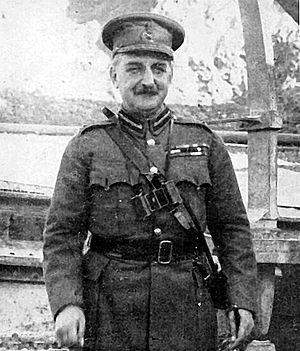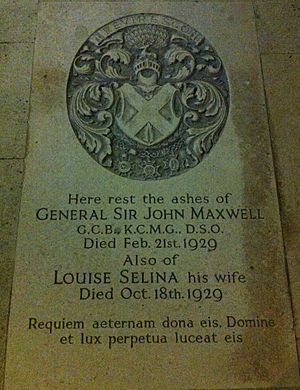John Maxwell (British Army officer) facts for kids
Quick facts for kids
Sir John Maxwell
|
|
|---|---|

General Sir John Maxwell, 1916
|
|
| Born | 11 July 1859 Liverpool, England |
| Died | 21 February 1929 (aged 69) Newlands, Cape Province, Union of South Africa |
| Allegiance | |
| Service/ |
|
| Years of service | 1866–1921 |
| Rank | General |
| Commands held | Northern Command Commander-in-Chief, Ireland British Troops in Egypt 14th Brigade |
| Battles/wars | Second Boer War First World War Easter Rising |
| Awards | Knight Grand Cross of the Order of the Bath Knight Commander of the Order of St Michael and St George Commander of the Royal Victorian Order Distinguished Service Order Mentioned in Despatches Order of Osmanieh (Ottoman Empire) Grand Cross of the Order of the Nile (Egypt) Grand Cross of the Order of the Crown (Italy) Knight of the Order of the White Eagle (Russia) |
General Sir John Grenfell Maxwell (born July 11, 1859 – died February 21, 1929) was a British Army officer. He also served as a colonial governor. He fought in several wars, including the Mahdist War in the Sudan, the Second Boer War, and the First World War. As the top military commander in Ireland, he was very involved in how the British government reacted to the 1916 Easter Rising. This included overseeing the military trials after the rebellion. Maxwell retired from the army in 1922.
Contents
Early Life and Military Start
John Maxwell was born in Aigburth, Liverpool, England, on July 11, 1859. His family had Scottish Protestant roots. He went to Cheltenham College for school. Later, he studied at the Royal Military College, Sandhurst, starting in 1878. He officially joined the army in 1879, becoming an officer in the 42nd Foot (Royal Highlanders) regiment.
Military Career Highlights
Maxwell served with the Black Watch regiment in the Anglo-Egyptian War of 1882. He helped attack Egyptian forts at Tel-El-Kabir. He rose to the rank of captain. He was praised for his good work during the Nile Expedition of 1884–1885.
He was very active with Egyptian forces in the Sudan. He earned a Distinguished Service Order for his bravery at the battle of Ginnis. He was also at the battle of Gemaizah in 1888. There, he was given the temporary rank of lieutenant colonel.
During the British reconquest of Sudan, he led the 2nd Egyptian Brigade. He was present at the 1898 battles of the Atbara and Omdurman. He was one of the first to enter the Khalifa's palace. In 1897, he became Governor of Nubia. In 1898, he was made Governor of Omdurman. He received an award from the Ottoman Sultan for his service in Egypt.
Fighting in the Boer War
Maxwell served in South Africa during the Second Boer War (1899–1902). He arrived in Cape Town in March 1900. He then took on a staff role. He led the 14th Brigade during Lord Roberts' march to Pretoria. After Pretoria was captured, he became the Military Governor of Pretoria and the Western Transvaal. He held this position from 1900 until March 1902.
As governor, he handled a difficult job with skill. A news report at the time said he "gained the confidence and esteem of the general public." After leaving Pretoria, he commanded a district in the west. He returned to the United Kingdom in July 1902, shortly after the war ended.
Lord Kitchener, the Commander-in-Chief, praised Maxwell in a report. He said Maxwell had "an energetic mind, and a sound judgment." He also noted Maxwell's "kindly and considerate disposition." For his service, Maxwell received several important awards.
After returning home, Maxwell became Chief Staff Officer of the Third Army Corps in Ireland in November 1902. He was promoted to colonel. He was also made a Commander of the Royal Victorian Order in 1903. This was for helping with King Edward VII's visit to Ireland.
Role in the First World War
In 1908, Maxwell became the General Officer Commanding British Troops in Egypt. He was sent to the Western Front at the start of the First World War.
He returned to his command in Egypt in late 1914. After the Ottoman Empire joined the war, General Maxwell announced that the press in Egypt would be censored. This meant many Arabic newspapers stopped publishing. He successfully defended the Suez Canal from an Ottoman attack.
In September 1915, another general complained that too few sick or wounded soldiers from the Gallipoli campaign were returning from Egypt. Maxwell replied that the Dardanelles (where Gallipoli was) had a "phenomenal and wicked" need for men.
The Easter Rising
The Easter Rising was a rebellion against British rule in Ireland. It began on April 24, 1916. The British government quickly declared martial law (military control) in Dublin. They also set up rules for military trials for anyone breaking wartime laws.
Maxwell arrived in Dublin on April 28, just as the rebels were surrendering. He took over as the top military commander in Ireland. He was given full authority by his superiors. Maxwell announced he would arrest all "dangerous Sinn Feiners." This included anyone who had supported the rebellion, even if they hadn't fought.
About 3,430 men and 79 women were arrested. This included 425 people for looting. Military trials began on May 2. These trials were held in secret, without defense lawyers or juries. This was controversial, and later ruled illegal by some legal experts. Some officers who led the trials had also fought against the rebels. This was a conflict of interest.
Ninety people were sentenced to death. Maxwell confirmed the sentences for fifteen of them. Fourteen were executed by firing squad between May 3 and May 12. These included all seven leaders who signed the Proclamation of the Irish Republic.
However, the British Prime Minister, H. H. Asquith, and his cabinet became worried. They were concerned about how fast and secretly the trials were happening. They stepped in to stop more executions. Maxwell later admitted that the public felt sympathy for the rebels. This was because it seemed the leaders were killed without a proper trial. As a result, Maxwell changed the remaining death sentences to prison time. The records of these trials were not made public until 1999.
Maxwell left Ireland later in 1916.
After 1916

In 1916, Maxwell was assigned to lead the Northern Command in York. He was promoted to full general in June 1919. He retired from the army in 1922. Sir John Maxwell died on February 21, 1929. His memorial is in the crypt of York Minster.
Personal Life and Interests
Maxwell married Louise Selina Bonynge in 1892. They had one daughter.
While in Egypt, Maxwell became very interested in archaeology. He was a member of the Egypt Exploration Society. After he retired from the army, he became its president. Through this society, Maxwell knew Lord Carnarvon. He was also in charge of Lord Carnarvon's will. Maxwell advised Lord Carnarvon's wife, Lady Carnarvon, about continuing the excavation of Tutankhamun's tomb. He also advised her and Howard Carter on legal issues with the Egyptian authorities.
Legacy and Remembrance
In March 1929, Maxwell's ashes were placed in the crypt at York Minster. His body was cremated in London. However, because he had served as a general for the Northern Command in York, it was decided that York would be his final resting place. His ashes were brought by train from London to York. Military personnel escorted them to York Minster. This was the first time such a ceremony had taken place in York Minster.
In May 2011, Maxwell's military awards and medals were sold at auction in London for £26,000.
 | Frances Mary Albrier |
 | Whitney Young |
 | Muhammad Ali |

